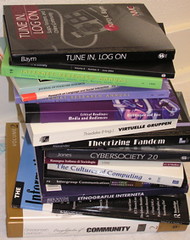Interview: Nancy Baym of Online Fandom (Part 3)
Kyle Bylin, Associate Editor
Bylin: During your keynote, Online Community and Fandom, you said, “The Internet has transformed what it means to be a music fan. Fans can and do build communities more rapidly and successfully now than ever before, with consequences not just for their own experience of music, but for everyone involved in the creation, distribution and promotion of music in any capacity.”
In The Social Affordances of the Internet for Networked Individualism, Barry Wellman and his associates concluded, “The developing personalization, wireless portability, and ubiquitous connectivity of the Internet all facilitate networked individualism as the basis of community.”
Q: How does the localization and mobilization of Online Communities and Fandom change the way we think about Mass Mediated Popular and Niche Interest Music Culture?
Nancy Baym: Mass mediated pop culture is going to continue. There will always be a market for the Britney Spears of the world. But like I was saying earlier about local cultures gaining transnational audiences, what used to be contained within tiny niches have increased potential to spread beyond niche status. This really came home to me when I heard Peter, Björn and John played between Diana Ross and U2 at a drive-in hamburger joint in the middle of Kansas.
How did they get there? It wasn’t because their small independent Swedish label had an aggressive international media campaign. It’s because the current niche environment allows the niche to go ‘mainstream’ more easily. In their case, they got a ton of attention from mp3 blogs before the mainstream took notice. Their radio airplay came after they topped Hypemachine’s most-blogged-bands list.
Online fandom is a way to build community around niches and give strength to those niches. People have more access to participating in niche scenes and niche bands have access to a much larger audience than before. For instance, I’ve talked to several Swedish bands and labels who have built huge audiences in Indonesia and South America because of the internet. Some are basically earning livings on their Indonesian concert revenues or by licensing their music to television shows in countries they never would have been heard before.
We should remember though that there are huge swaths of the globe that have minimal access to the internet and that even in wired nations there are many people who don’t use the internet this way — in the big picture of music in the world, there will be regional niche scenes that are entirely offline for years to come.
Bylin: Recently, you said that you were, “discouraged by what seemed to be backwards thinking regarding what I see as the great opportunities of the era of the networked audience.”
Q: For the future of “The Networked Audience,” what do you believe are some of its milestones and critical junctures left to navigate?
Nancy Baym: The audiences are already in a pretty good place, it’s the recording industry that’s behind. The obvious milestone will be resolution of the file-sharing debate. File sharing is not going to stop, and as long as industry is focused on that, it’s not paying enough attention to how it can work with the networked audience to build excitement and spending around what they have to offer. Instead they are alienating the very people on whose spending they depend. I understand that people are losing jobs (though new ones are being created in other sectors of the music industry – witness the employees of Last.fm, MySpace Music, etc), that revenues for CD sales are down, and that all of this is a huge threat to the industry as it has existed for since shortly after Edison invented the phonograph. But in the long view, the recorded music industry has been around for a tiny fraction of the time that music and music audiences have been around, and if it is to continue, that industry will have to accept enormous changes. Otherwise artists and audiences will develop ways to work around the industry until the industry as it currently exists is irrelevant.
There will be more than one business model that enables people to make money in music, so another milestone will be the development of a clear set of choices which are adaptable and flexible for different kinds of artists and different kinds of audiences so that people don’t have to keep trying to figure it all out on their own.
Another milestone will be the development of a new kind of intermediary who works with bands, managers and labels to help them understand and participate in social media effectively. We’re seeing a few of these people and agencies popping up, but it’s a long way from being the norm. We can’t expect artists to spend all their time online cultivating audiences or being experts in social media, just as we didn’t expect them to act as their own managers.
The biggest critical juncture will be an attitude shift in which the industry stops operating out of the fear of lost control and starts operating out of a recognition that online fans are the best promotional team bands can have, that they can build you audiences you never imagined possible, and that they deserve respect and collaboration even when you don’t like what they have to say.
